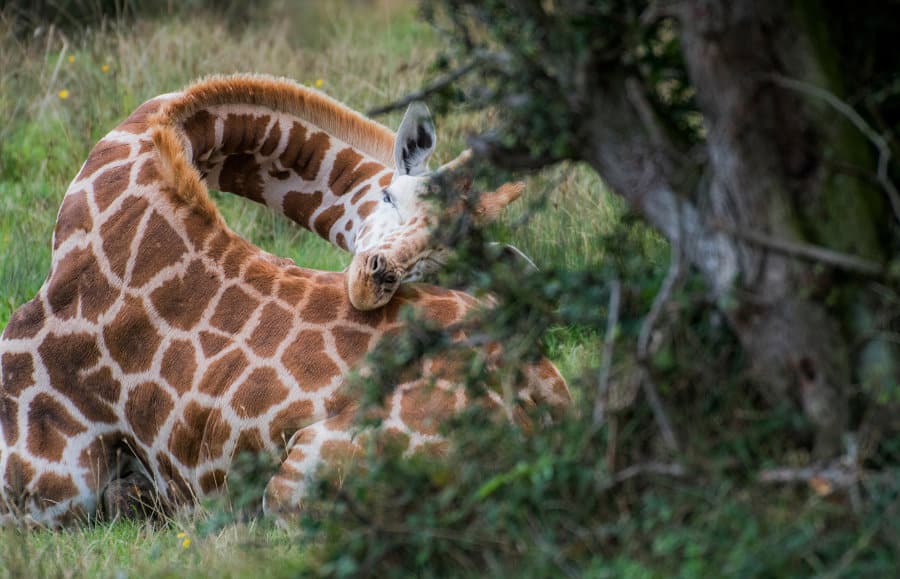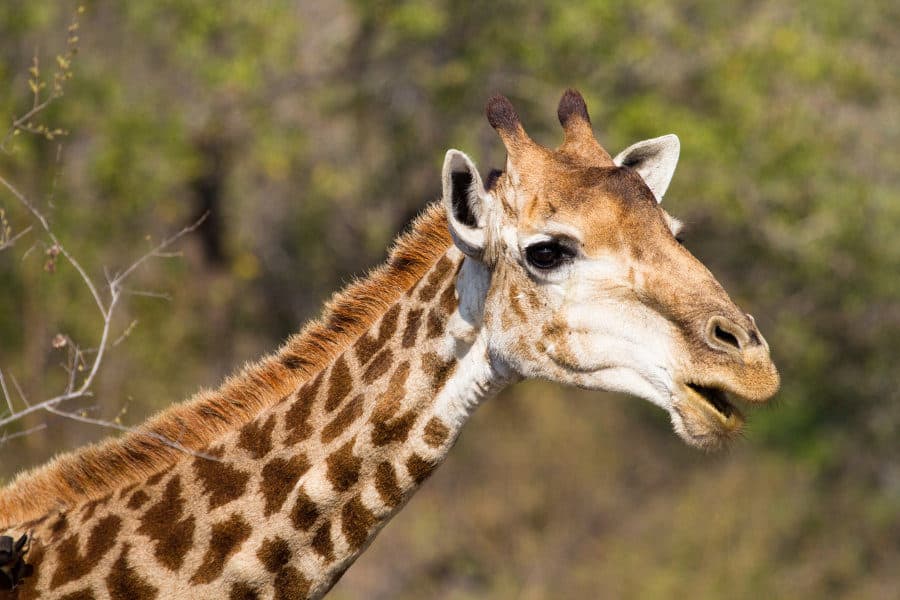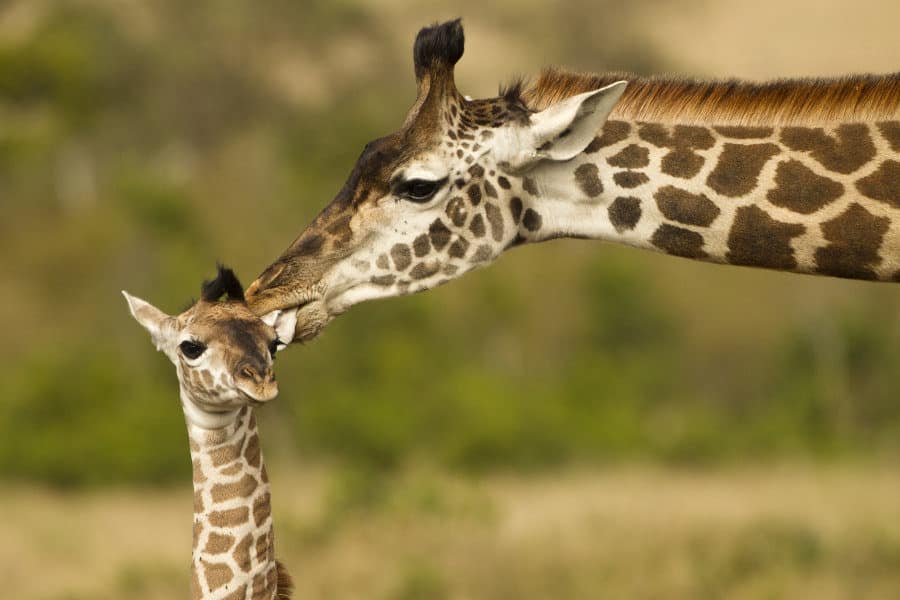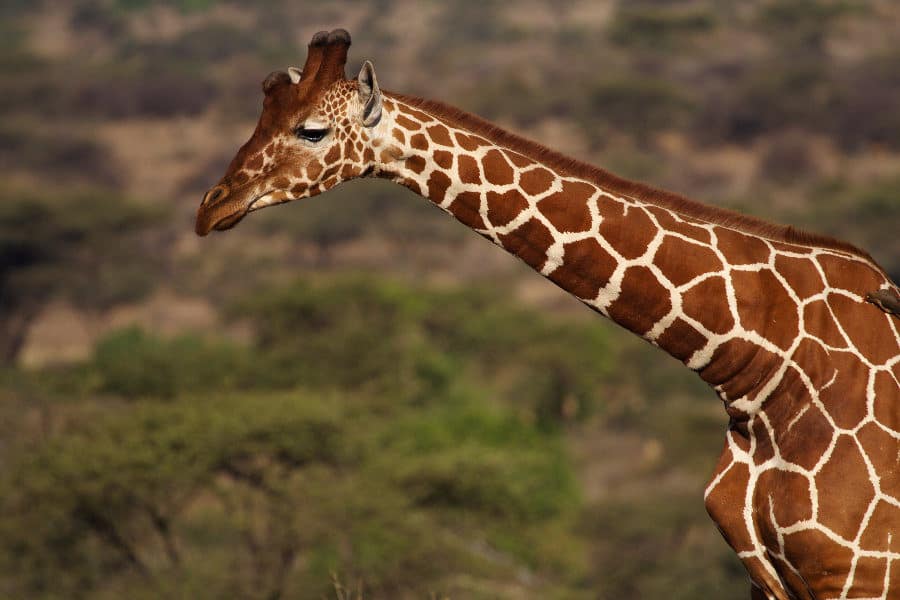Giraffes are strange and fascinating animals, with a completely unique sleeping style. They don’t fuss about where, how, or when they get some shut-eye.
Think about how humans get after pulling an all-nighter, or after days of sleep deprivation. Their brains basically stop functioning. Sleep is vital for the body to keep going.
But animals in the wild cannot afford this luxury. Especially prey animals, like giraffes. They have adapted to survive on less sleep, in uncomfortable positions, to avoid becoming dinner.
But how exactly do giraffes sleep, and for how long? Let’s find out!
How Long Do Giraffes Sleep in the Wild?
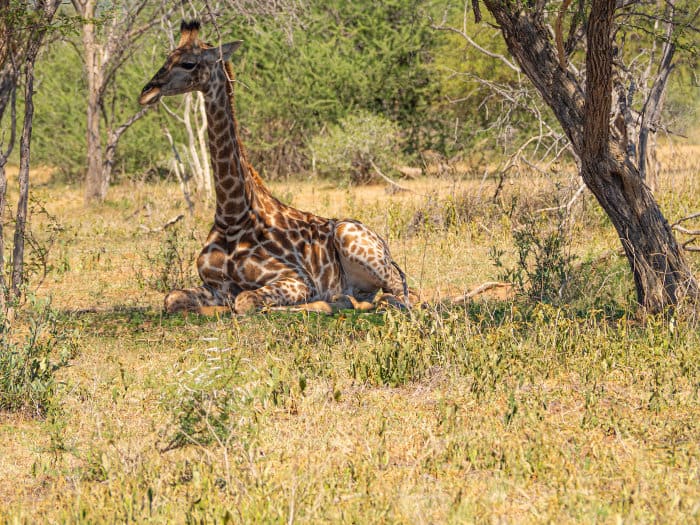
Giraffes sleep an average of 40 minutes a day. That’s less than the time that most humans spend getting ready for bed.
Imagine sleeping in bursts of five minutes, scattered throughout the day. Seems impossible, right?
Nonetheless, giraffes are never asleep for more than a few minutes in one go. Out in the wild, they have to constantly be on their toes, protecting themselves from predators.
After all, lying on the ground, sound asleep would be like offering their lives on a platter to the nearby carnivores. Yet there are so many prey animals in the wildlife ecosystem. Why is it that giraffes have the shortest sleep cycle?
Why Do Giraffes Sleep So Little?
Giraffes are really tall mammals, with 3-meter-long lanky necks. They can run at speeds of up to 38 miles per hour (60 kilometres per hour).
Although predators in the wild can run much faster and can easily outrun these animals. How scary is that?
Giraffes need to be alert at all times, in order to avoid predation. Their bodies are not really capable of offering the best defense.
It seems absurd, given their large size, doesn’t it? But they don’t possess sharp teeth or thick hides and are unable to put up a good fight when attacked.
But they sure can kick, which can prove to be nasty for the predators. In order to land that fatal kick, though, they need to be upright.
To leverage the strength in their legs, giraffes compromise on the one thing most mammals can’t give up – sleep. They’re always on the move.
The evolution that has taken place, being able to survive without much sleep, is what helps keep the animal safe.
What animal sleeps the least?
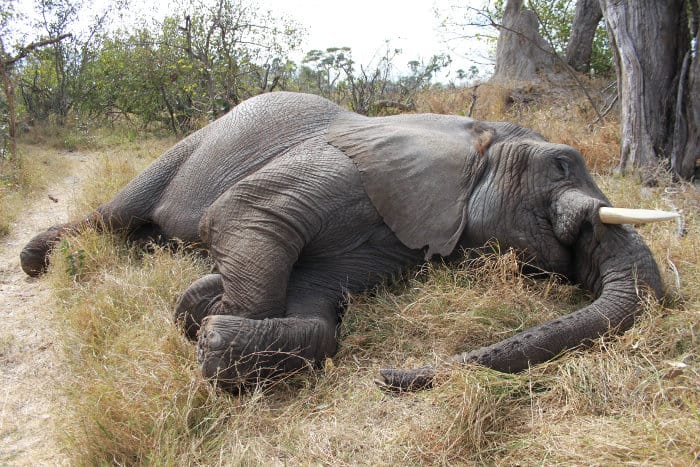
The giraffe has the shortest sleep cycle in the animal kingdom. The elephant follows suit, requiring only two to three hours of fragmented sleep.
Other mammals that hardly sleep are deer, sheep, and horses.
Do you notice any sort of similarity between these animals?
Yes, you’re right. They’re all prone to becoming food for predators. They need to stay alert to protect themselves and their herds from hunters.
The alternate theory for why giraffes sleep so little
Giraffes need a lot of calories to sustain their bodyweight, owing to their massive structure. This is the reason why they spend a good portion of their day, around 16 to 20 hours, actively feeding.
Their digestion process is a little different from that of other mammals.While they eat a lot of plants, they also need to bring up their cud – their partially digested food – and break it down further through chewing.
With the chewing of the actual food and the cud, the giraffes don’t have much time for sleeping. Looks like they’re the busiest animals in all of Serengeti, doesn’t it?
Naturally, they perceive sleeping as a not-so-important activity and get through on catnaps.
How Giraffes Sleep
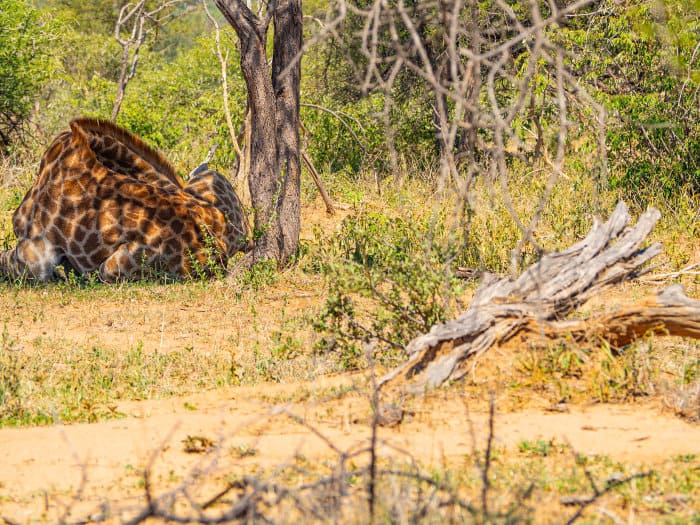
But doesn’t the process of lying down, falling asleep, and standing back up, take more than the time the giraffes need for sleep? How then do these mammals manage to catch some shut-eye in such a short span?
As happens with most species on the planet, the babies are usually more at ease compared to their parents and so sleep more comfortably.
The adults have the responsibility of protecting themselves, as well as their little ones, and are more vigilant in their way of sleeping.
Do giraffes lay down to sleep?
More often than not, giraffes sleep standing up, with one eye open and ears alert. That’s got to be tiresome. When they really do need to catch some rest, they fold their legs under their bodies and lie down.
Even though they are horizontal, they keep their necks vertical. Even in this extremely relaxed state, they are constantly scanning for potential threats.
Occasionally, these mammals do let down their guard and rest their heads back on their rump. However, they are extremely vulnerable and exposed in that position, so this state of deep sleep doesn’t last for more than a few minutes.
How do baby giraffes sleep?
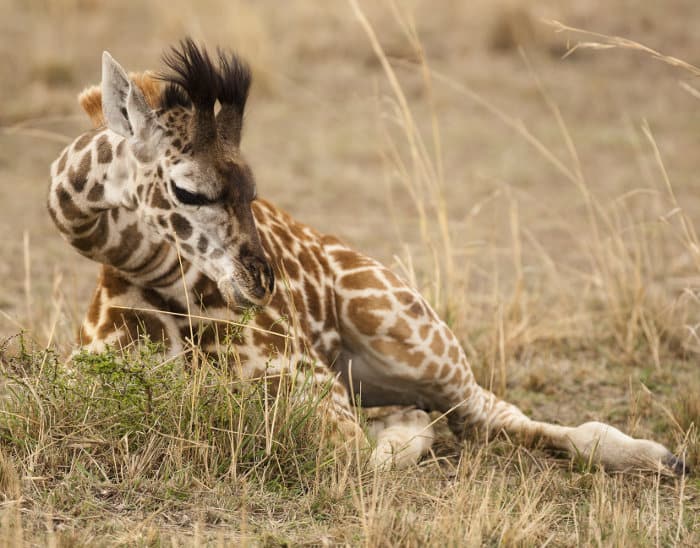
If you see baby giraffes sleeping, you’ll notice that they always sleep in the position that their adult counterparts choose to avoid. They don’t have to worry about being on the run as the adults have that responsibility.
The babies lay down and tuck their legs beneath their bodies, using their rumps to rest their heads. Woah! They get to sleep on some really furry pillows out there.
Lowering their bodies is a tedious process. The calves get to sleep for longer periods of time, with the adults watching over them, so they don’t mind. Aren’t the little ones lucky?
What are the other animals that sleep standing up?
Sleeping standing up is not an easy task. It requires the legs to be strong and vertically aligned. Apart from giraffes, other larger animals like horses, elephants, and zebras can sleep standing up.
Cows are also capable of sleeping while standing, although they mostly prefer to lie down.
Smaller creatures like flamingoes also stand when they sleep. They live on caustic salt flats and do not have any place to sit or lie down.
When Do Giraffes Sleep?
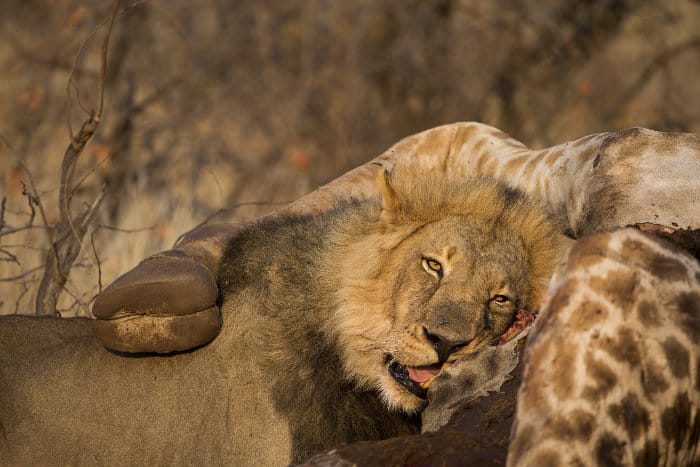
At around midnight, giraffes prefer to spend their time feeding instead of relaxing under the bright moonlight. They generally lay down for a few minutes during the darker hours of the night.
In the early mornings, they sleep standing up, while ruminating and surveying. Still keeping one eye on the lookout.
Female giraffes have their own sleep cycles, especially when they’re nursing an offspring.
Listening to their maternal instincts, they stand guard over their calves, trying to keep them under the carnivores’ radar. Despite all the precautions, the hunters manage to catch hold of the little ones as they are easy prey.
How Long Do Giraffes Sleep in Captivity?
As opposed to constantly being in grave danger out in the wild, giraffes are relatively safe while in captivity. They don’t fear falling prey to predators that would normally keep them on their toes.
These giant herbivores sleep for an average of 4.5 hours every day in captivity, while still not sleeping more than a few minutes in one go.
Also, their sleep patterns change when they’re under stress.
Who would have imagined that giraffes could lose sleep over stressful days?
When giraffes move from one zoo to another, or lose a mate, they tend to sleep for fewer hours than normal. Or end up losing their sleep altogether.
Threat of Extinction
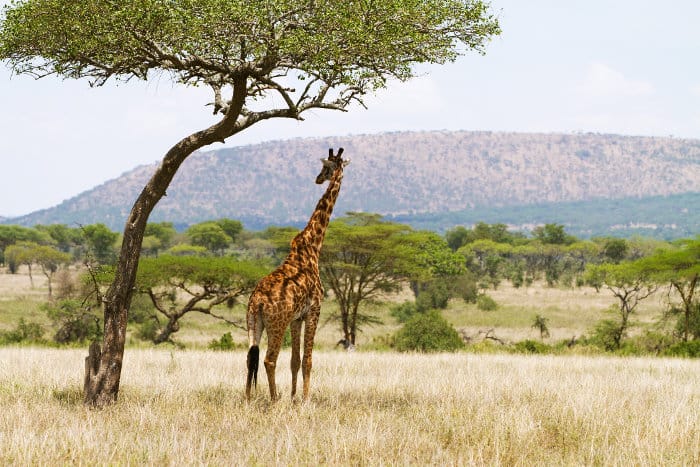
Giraffes are an endangered species and face extinction. Researchers have confirmed that their population has declined by 40% since 1985.
Some subspecies, like the reticulated giraffes, are fading away at much higher rates. Their population is plummeting at a rate of nearly 80%.
Giraffes are increasingly being hunted for their hides, tails, and meat, by various African tribes.
They’re also losing their habitats due to the requirements of firewood, agriculture, buildings, and other human necessities.
There are a few organisations like the African Wildlife Foundation, that are trying to revive the giraffe population in the African savannah.
Conservation Efforts
This harmless animal, roaming the plains of the African wildlife ecosystem, is facing dangers from all sides.
While it can protect itself from wild predators by giving up sleep, how can it protect itself from the atrocities committed for commercial gains?
Efforts are being made by the wildlife conservationists from the Giraffe Conservation Foundation to educate the local tribes about sustainable agricultural practices. Without hampering the habitats of the animals.
Wildlife tourism is greatly encouraged in Africa, with tourism revenues going towards conservation efforts. It is up to the discretion of the visiting guests to cause minimum disruption to the daily lives of the resident animal species.
If you’re planning on visiting Africa and watching the stupendous giraffes in action while catching the rare sight of them being asleep, book your safari now.
